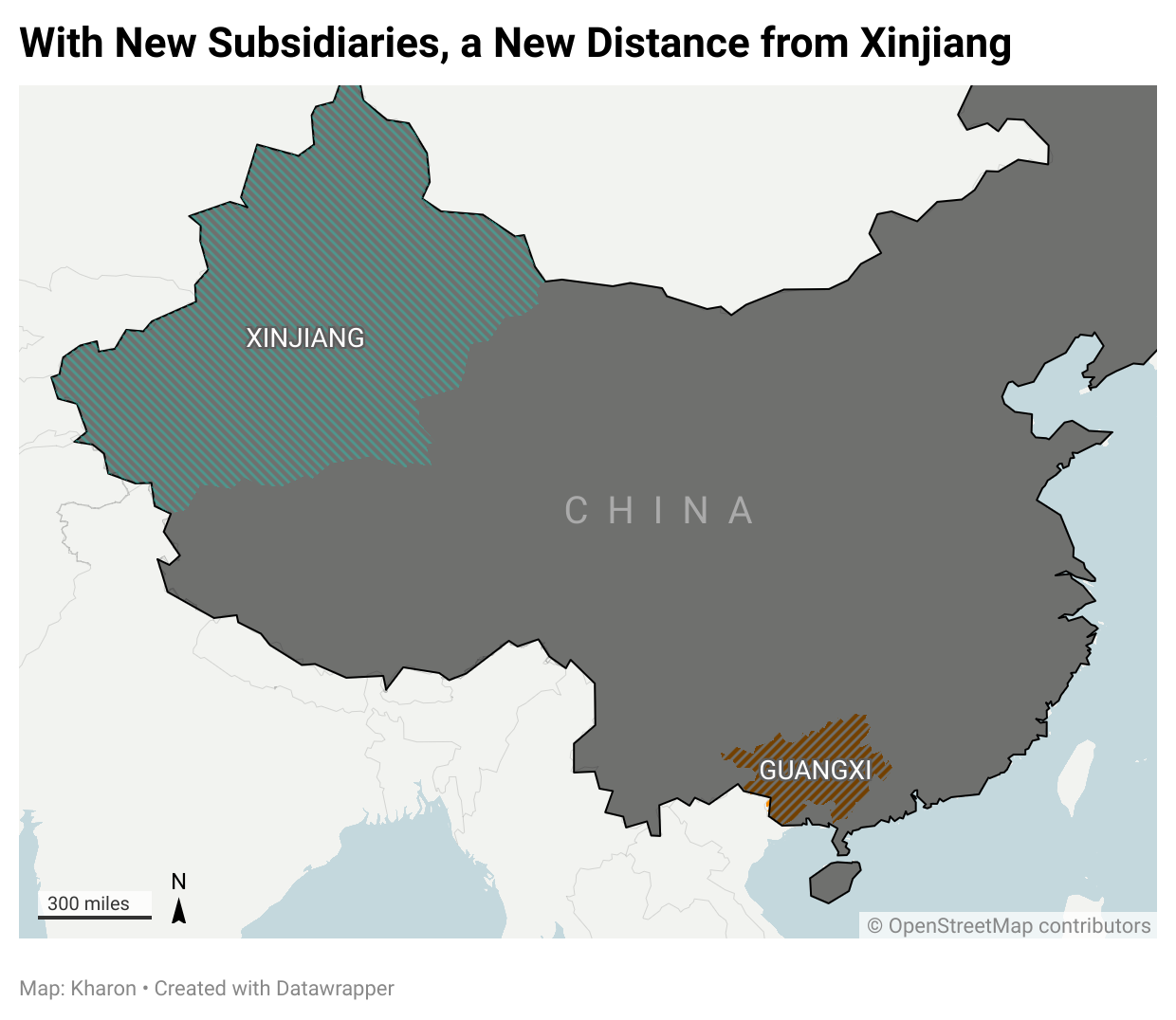Some Chinese companies that the U.S. has cited for suspected forced labor use aren’t slowing down. They’re changing course.
Kharon research has found that a number of firms on the U.S. government’s Uyghur Forced Labor Prevention Act (UFLPA) Entity List are establishing new subsidiaries far from Xinjiang. That’s expanding their product diversity—and allowing them alternate logistical routes to keep their goods moving into global supply chains.
Case study: Guangxi Hongtai New Materials Co., Ltd. was incorporated in January in Nanning, Guangxi, with ¥345 million (about $48 million USD) in registered capital. Corporate filings describe its core business as “non-ferrous metal rolling and deep processing.”
Public shareholding records also show that Guangxi Hongtai is wholly owned by Xinjiang Joinworld Co., Ltd., a maker of high-purity aluminum, electronic aluminum foil and alloy products. The U.S. Forced Labor Enforcement Task Force added Xinjiang Joinworld to the UFLPA Entity List in November, just two months before Guangxi’s incorporation.
In practice: Guangxi Hongtai was established in part to facilitate Joinworld’s investment in a new aluminum development in Guangxi, according to a Joinworld securities disclosure. The project, which will be constructed in coastal Fangchenggang City by a company in which Joinworld owns a 67% stake, aims to produce 2.4 million tons of alumina per year, the disclosure said.
Kharon research has found that a number of firms on the U.S. government’s Uyghur Forced Labor Prevention Act (UFLPA) Entity List are establishing new subsidiaries far from Xinjiang. That’s expanding their product diversity—and allowing them alternate logistical routes to keep their goods moving into global supply chains.
Case study: Guangxi Hongtai New Materials Co., Ltd. was incorporated in January in Nanning, Guangxi, with ¥345 million (about $48 million USD) in registered capital. Corporate filings describe its core business as “non-ferrous metal rolling and deep processing.”
Public shareholding records also show that Guangxi Hongtai is wholly owned by Xinjiang Joinworld Co., Ltd., a maker of high-purity aluminum, electronic aluminum foil and alloy products. The U.S. Forced Labor Enforcement Task Force added Xinjiang Joinworld to the UFLPA Entity List in November, just two months before Guangxi’s incorporation.
In practice: Guangxi Hongtai was established in part to facilitate Joinworld’s investment in a new aluminum development in Guangxi, according to a Joinworld securities disclosure. The project, which will be constructed in coastal Fangchenggang City by a company in which Joinworld owns a 67% stake, aims to produce 2.4 million tons of alumina per year, the disclosure said.
- Having these new subsidiaries in Guangxi positions the Joinworld network’s goods closer to ports and to coastal original equipment manufacturers (OEMs). It also creates a distance from Joinworld’s Xinjiang base across the country and, perhaps, from the U.S. scrutiny that’s trained there.

Kharon users can explore these UFLPA-related Insights in greater detail using the ClearView platform.
Data point: In Joinworld’s November 2024 designation, the U.S. task force said it had “reasonable cause to believe” that Joinworld—whose products have a wide range of application in the automobile and aerospace sectors—works with Xinjiang authorities to recruit, transfer, and exploit Uyghurs and other minorities for forced labor.
U.S. Customs and Border Protection data show that the agency escalated its inspections and mass denials of Chinese automotive and aerospace shipments under the UFLPA starting last fall, before overall drops in recent months.
Big picture: Other companies, Kharon found, have expanded their businesses after the U.S. added them to the UFLPA list, too. One, Shandong Meijia Group Co., Ltd.—known for processing, selling and exporting frozen seafood products—incorporated a new subsidiary in January focused on packaging technology.
In brief: The swift creation of Guangxi Hongtai, only months after Xinjiang Joinworld was added to the UFLPA Entity List, underscores how listed Chinese conglomerates may adapt rather than retreat under U.S. pressure.
Xinjiang conglomerates often use holding companies, trusts and minority joint ventures in ways that blur their paper trails. Compliance programs that stop at first-tier names on government screening lists will miss these new offshoots. Visibility beyond Xinjiang, and beyond first-tier suppliers, is now even more essential.
Insights break down a Kharon investigation and why it matters, in 3 minutes or less.
U.S. Customs and Border Protection data show that the agency escalated its inspections and mass denials of Chinese automotive and aerospace shipments under the UFLPA starting last fall, before overall drops in recent months.
Big picture: Other companies, Kharon found, have expanded their businesses after the U.S. added them to the UFLPA list, too. One, Shandong Meijia Group Co., Ltd.—known for processing, selling and exporting frozen seafood products—incorporated a new subsidiary in January focused on packaging technology.
In brief: The swift creation of Guangxi Hongtai, only months after Xinjiang Joinworld was added to the UFLPA Entity List, underscores how listed Chinese conglomerates may adapt rather than retreat under U.S. pressure.
Xinjiang conglomerates often use holding companies, trusts and minority joint ventures in ways that blur their paper trails. Compliance programs that stop at first-tier names on government screening lists will miss these new offshoots. Visibility beyond Xinjiang, and beyond first-tier suppliers, is now even more essential.
Insights break down a Kharon investigation and why it matters, in 3 minutes or less.
Read more from the Kharon Brief:







